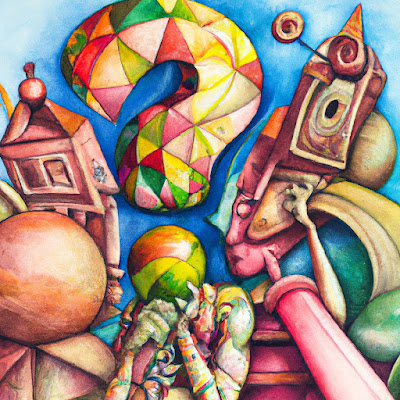by Dick Altman
Alarmed by A.I. Chatbots, Universities Start Revamping How They Teach: With the rise of the popular new chatbot ChatGPT, colleges are restructuring some courses and taking preventive measures. —The New York Times, January 16, 2023
Disclaimer: ChatGPT inspired
but did not write this poem. And
what if it did? What, at bottom,
are we afraid of—that a machine
might outthink us? From childhood,
I thrilled to science fiction evolving
into science fact. Bring on the
machines!
If Socrates were alive today,
I can hear him ask, “Why spend life
trying to find answers,
when life’s key may lie
in finding the right questions?”
The best leaders, I often think,
posit the best questions.
Ask the right question, I’d tell
my peers, and you may find
exactly the answer we’ve all been
probing/struggling for.
As AI’s narrative powers grow,
exponentially/computationally,
we need to learn how best
to feed its appetite.
Think about your day and mine—
think about the river of questions
that ebb and flow through life’s
continuum.
Rarely do we ponder the process
that instinctively—or so it seems—
lets us arrive at decisions that
guide home/work/play/passion.
One could argue—and I’d agree—
all conscious life thrives, or fails,
on the quality of its questions.
Perhaps we have reached the age
to turn education on its head—
to teach our young "The Art
of the Question".
So that apps like ChatGPT
can learn, in turn, to grind out
answers worthy of our curiosity
and explorations.
Think of it as a new educational
dawn.
I say let’s welcome, not fear,
the rising binary sun
of a Socratic Age reborn.
Or as Hamlet might have
prophetically put it:
To ask...
To answer...
That is the question
Dick Altman writes in the high, thin, magical air of Santa Fe, NM, where, at 7,000 feet, reality and imagination often blur. He is published in Santa Fe Literary Review, American Journal of Poetry, riverSedge, Fredericksburg Literary Review, Foliate Oak, Blue Line, THE Magazine, Humana obscura, The Offbeat, Haunted Waters Press, Split Rock Review, The RavensPerch, Beyond Words, The New Verse News, Sky Island Journal, and others here and abroad. A poetry winner of Santa Fe New Mexican’s annual literary competition, he has in progress two collections of some 100 published poems. His work has been selected for the forthcoming first volume of The New Mexico Anthology of Poetry to be published by the New Mexico Museum Press.


